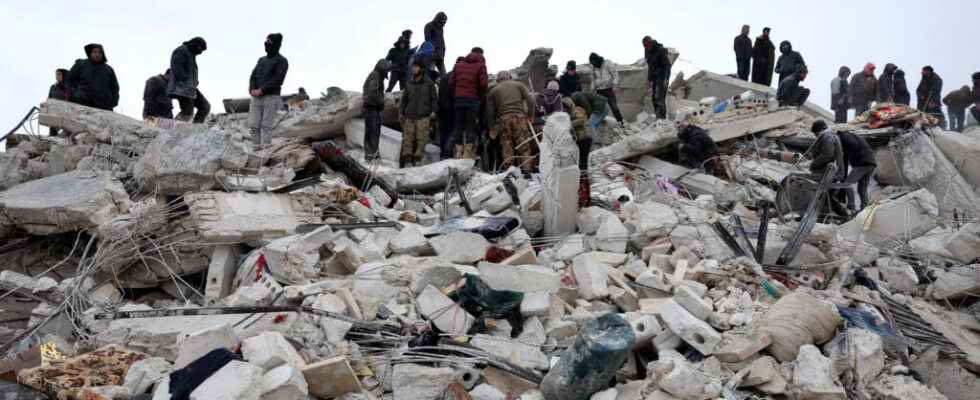The death toll from the earthquakes in Turkey and Syria is approaching 10,000. Two days after the disaster, emergency services are busy in the rubble of collapsed buildings, looking for people trapped under the debris. In Syria, already devastated by more than 11 years of war, access for humanitarian aid is difficult, particularly in the Idleb region, in the hands of rebel and jihadist groups. Interview with Professor Raphaël Pitti, humanitarian doctor and training manager for the NGO Mehad.
RFI: What is the situation in the Idlib region?
Raphael Pitti: It is an area where approximately 4.2 million people reside and among them, 2.8 million people displaced from areas of violence. They live in camps. Many of them have transformed their canvas camp into small houses, huts, made of cinder blocks with tin roofs. Today, all that has been razed. Those who were in tents are perhaps happy today to consider themselves lucky. Many houses are also cracked, people don’t dare stay inside. And I had on the phone one of my friends, a surgeon, who knows this area well, who told me that people stay outside.
However, it is extremely cold, it is snowing, and it is raining. The White Helmets, civil security, work intensely to try to find living beings still under the rubble. But you have to know that over time unfortunately, and given the cold, the risk of hypothermia, there is less and less chance of finding people alive. At some point, we will have to make the decision to stop looking in the rubble, of course, it’s a disastrous situation.
This area of Idleb, controlled by rebel and jihadist groups, is only supplied by one humanitarian corridor, that of Bab al-Hawa, on the Turkish border. The opening of this corridor was fiercely negotiated with Moscow and Damascus, under the aegis of the UN, and it must be renewed every six months. How is this aid channeled today?
The Bab al-Hawa border post, while still open for trucks supplying the region, is unfortunately closed for people, including the sick. We cannot therefore evacuate the most seriously injured to Turkey, as was done before. The hospitals in this area are overwhelmed by the number of victims. There is a lot of ” crush-syndromes i.e. limb crush syndromes, which cause kidney failure and dialysis problems for these patients, so the number of casualties that can be expected will increase further. in the next few days.
► Also to listen: Decryption – Earthquake in Turkey and Syria: the absolute urgency
This passage of Bab al-Hawa, it is still located in an area that was also affected by this earthquake…
Absolutely. Many roads are destroyed, which poses real problems for the transport of material to the interior of Syria. In this area of Idleb, there are only 70 intensive care beds, there is not enough oxygen and biology laboratories for patients. It is therefore to be truly expected that in the near future, the number of deceased persons will be very high.
Could we imagine the opening of other corridors for the delivery of humanitarian aid?
Yes, I think it is important, and we have asked for it, to ensure that the international community can obtain an emergency meeting of the Security Council, and that there can be a reopening of the humanitarian corridor which passed through Bab al-Salam, near Afrin. This corridor was closed along with two others, only the Bab al-Hawa corridor remained, where the resolution for the extension must be renewed every six months. What we are asking for is the reopening of these two humanitarian corridors. And of course, not for six months, but for a year, given that it will be necessary to rebuild, that it will be necessary to take care of the millions of people affected today by the earthquake. There is a humanitarian need to reopen these corridors.
► To listen also: Today the Economy – The earthquake, a blow for economies already in bad shape
► Discover Mehad NGO
